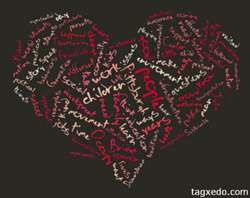
I am struck by these questions as I read and hear the mean things - just plain mean and hateful and divisive and spiteful - that come from the mouths of our leaders and leader - wannabes.
Here is what I remember about learning about kindness. I am really interested in your own journey - so let us know!
There were so many examples of kindness in my life growing up - parents, grandparents, teachers, neighbors. I saw kindness, felt kindness, and heard about kindness. There was a strongly verbalized expectation that we behave and not hurt others, that we be respectful. Granted, the learning was often reinforced through spanking or other punishment - which always confused me, even way back then. But we were NOT to make fun of others, especially those less fortunate than we were. We were expected to be grateful for what we had, for our lot in life. We were not to be mean to one another - can you believe that we would be grounded for saying mean things to a brother or sister? For calling someone "stupid" or telling someone to "shut up"?
I read voraciously as a child - and still do - hence my greediness in owning an iPAD and a Kindle and hundreds of books. Many stories stayed with me as examples of kindness - as other models of how to be a good person. Just a few (some of which may be familiar to you) - The Five Little Peppers and How They Grew, Little Women, Elsie Dinsmore, A Wrinkle in Time, even Nancy Drew. We had Brownies and Girl Scouts who very explicitly promoted good citizenship. We had Sunday School and church that also taught goodness. Lots of examples in words, deed, and actions.
And yet. It wasn't that simple. There was racism, classism, sexism, hetero-sexism, anti-other-religions-not-like-ours implicit in most of those lessons - invisible but present and easily absorbed without even recognizing it. Even words and deeds of respected and loved adults often held confusing contradictions.
But we keep trying, don't we? Most of us?
There are theories in psychology (of course, we love to make up theories!) about stages of the development of compassion/faith/belief. At earlier stages, usually associated with very little kids, we see the world as black and white/good and bad - people are either totally good or totally bad - nothing in-between. At earlier stages, also, kids behave well to avoid punishment. As we mature, we begin to recognize that there are other advantages to "doing good" - to being kind - than just avoiding punishment - we develop empathy and understand what it is like to hurt, ourselves, when someone is mean to us, and we then try not to do that to others.
We begin to think outside of ourselves a little, outside of our own families and communities as we become more aware of the larger world, and begin to ask questions - about evil, about differences between cultures and traditions, about the inconsistencies in our own. As adolescents, we sometimes turn our backs on the traditions in which we were raised, and try to find our own path - sometimes coming back to the original one in the end and sometime forging a new one.
Then we grow up even more. James Fowler, a psychologist, calls the final stage of faith development the "Universalizing Stage" - in which one has the sense of an ultimate environment that is inclusive of all beings - there are no divisions between people based on religious traditions, race, ethnicity, nationality. There is one-ness - and faith is geared toward compassion and forgiveness.
People often associated with this final stage of development are Martin Luther King, Jesus Christ, Gandhi, Mother Teresa, and, I always add - Fred Rogers - and I am certain that there are figures from many other traditions who could also be added.
Often these stages are described in relation to chronological age - but you know what? I have known 6 year olds who think in a Universalizing way - and I have known 50 year olds who are stuck back in the concrete black and white stage, who are very me-focused, rigid, judgmental. Haven't you?
So what is so discouraging in the news to me recently is seeing examples of grown-ups saying mean, disrespectful, hateful words, particularly about vulnerable people - poor, old, very young, disenfranchised, sick, unemployed. (Guess I should also ask the question - where do we learn to be mean? how does this happen?)
There is a whole mass of people out there - at both ends of the political spectrum - who are becoming sick, sad, and angry about this kind of talk. Check out Jim Wallis' recent blog for some thoughts about this.
We elect our representatives to act as public servants - to speak for all of us, not just some of us. Government in a democracy is not supposed to be like a football game, where the desire is to "crush the other side" (see Grover Norquist's 60 Minutes Interview as just one example of this "crush your opponent" mentality). It is supposed to be an institution or process through which we learn to live together in the best, most fair, and most just ways that we can.
I yearn for words and ideas and actions that raise us up, that encourage us to be our best selves and, in being our best selves, make the world a better place for all. I hunger for inspiration. My dad just finished reading That Used to be Us, by Thomas Friedman and and Michael Mandelbaum - Dad said that these guys suggest that our two party system needs to be shaken up by the addition of one person who cares less about winning or crushing the other side than about speaking the truth. Interesting idea. And I am sure the next question is, "Whose truth?" Are there universal truths? I know that some of us believe that there are.
I return to my original questions - where did you learn to be kind? how did you learn to love? can we put a little more of that out there? can we spread it around?


 RSS Feed
RSS Feed
